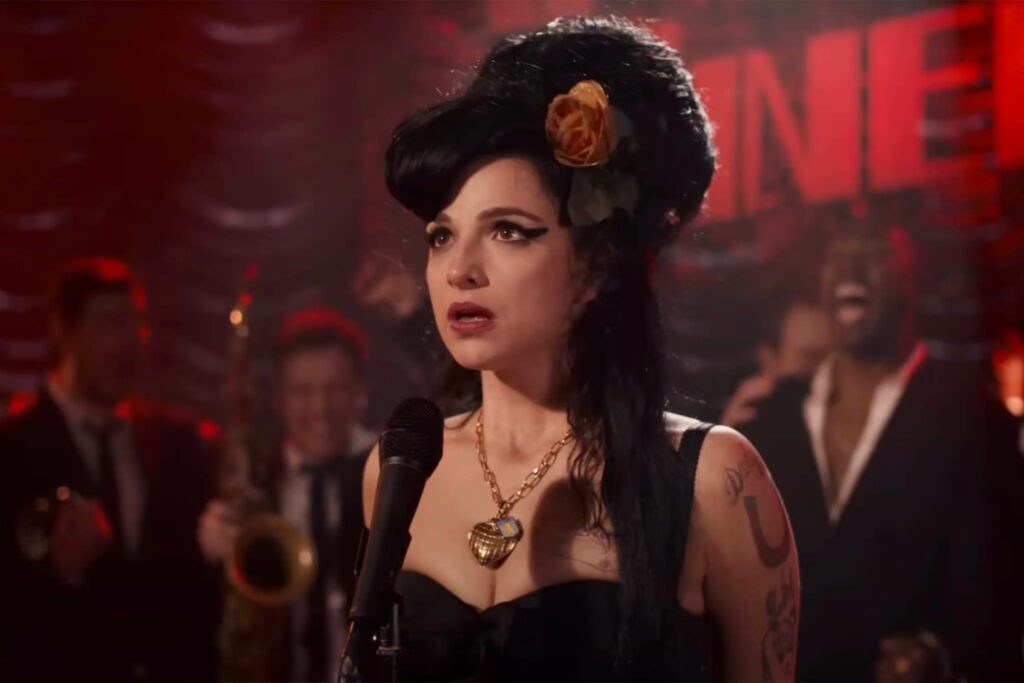‘Back To Black’ review: Amy Winehouse biopic is powerful but plays it safe
Back To Black scarcely scratches the surface of Amy Winehouse's personal demons, but it is anchored by a masterful performance from Marisa Abela
By Anna Smith

There are a lot of things Back to Black isn’t. It’s not a traditional biopic. It’s not a probing investigation into what went wrong. It’s not a thorough exploration of Amy Winehouse’s music. It is an involving portrait of romantic obsession and a touching tribute to a great talent, assuming you can get past the fact that no-one will ever be able to replicate Amy.
Actress Marisa Abela gives us a likeable and vulnerable version of Amy, whom we first meet as a lively 17-year-old. She goes from stealing the show at family singalongs to tearing the clothes off a series of boyfriends. She tells would-be manager Nick Shymansky (Sam Buchanan) that she “ain’t no Spice Girl” and proceeds to prove it over the next few years, belting out the hits and storming out of label meetings as quickly as she arrives (invariably late).
She is propping up the bar in the Camden boozer The Good Mixer when her life changes, and the film comes alive. Blake Fielder-Civil (Jack O’Connell) swaggers into the pub and she is instantly smitten. They drink, they play pool, he delivers an amusing version of The Shangri-Las’ Leader of the Pack… before his girlfriend arrives to spoil the party. Director Sam Taylor-Johnson has stated that the film is told from Amy’s perspective, saying, “She sees only good because love is blind.” And so we feel the tangible connection between Amy and Blake, who’s played with cheeky charisma by O’Connell. The film then charts their rocky relationship and the resulting best-selling album, ending before her death in 2011.
Recreating Amy’s performances for the Grammys and at Glastonbury, Marisa does her own singing, and approximates her style well, even if she can’t match it. Meanwhile the score by Nick Cave and Warren Ellis enhances the feeling of intimacy with its impressionable young protagonist.
The locations are catnip for Londoners – the filmmakers used 54 locations, from Primrose Hill to the infamous Dublin Castle. Up until the first scene in the Good Mixer, we only really get a sense of Amy’s fame from the fact that Blake finally admits to recognising her. Later, the tabloid photographers follow her wherever she goes. Made by a majority female crew, Back to Black has something to say about the music industry and the tabloid press, and implicitly how Amy’s age and gender impacted how she was portrayed. But Taylor-Johnson and writer Matt Greenhalgh keep the focus on Amy, avoiding lurid headlines and news reports. They also skirt past some of the details the papers revelled in – we see Amy drunk, but drugs only occasionally feature.
Anyone who’s seen the 2015 documentary AMY might be expecting Amy’s father, Mitch (Eddie Marsan), to be the villain of the piece. Not here. He’s shown as a loving, concerned father who is perhaps too soft on his daughter – and many will feel the film is too soft on him. Taylor-Johnson “did not want to be beholden to anyone for any approvals” according to producer Alison Owen, but the team did talk with her family and friends. The emphasis is firmly on familial love, which leads to moving scenes between Abela and Lesley Manville, who plays the grandmother Amy adores. The film also has moments of humour, many thanks to Winehouse’s famous candour.
Back to Black won’t please everybody, but it is a good, well-made film that tells part of Amy’s story with affection, sensitivity and a palpable respect for her talent.
